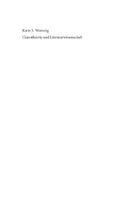Chaostheorie und Literaturwissenschaft
Author(s)
Wozonig, Karin S.
Collection
Austrian Science Fund (FWF)Language
GermanAbstract
This book presents the development and present status of adaptions of chaos theory for literary studies. Furthermore the integration of these methodological approaches into a discipline that is oriented towards cultural studies is demonstrated. The publication consists of four parts. The first part of the work deals with the issues created through questions posed by historical philosophy and historiography. It discusses how reflections on linear time, as well as on the description and explanation of sequences, circularity and synchronicities lead to an increased complexity in the semanticts of time in the notion of the objects analized. It also discusses the integration of discourses from other disciplines into literary history. It is demonstrated that both aspects - increased complexity and supplementary discourses - are highly influential in hermeneutical literary studies.
The second part deals with changes in the notion of time in the modern and so-called post-modern era. It focuses especially on non-linearity, the increasing importance of historical time in the natural sciences and on the effect of this tendency on the analysis of highly complex structures outside of the natural sciences. In the third part of the publication concrete examples of the adaption of chaos theory for literary studies are examined - especially their epistemological interest, their position within the framework of the discipline and their interdisciplinary potential. This part elucidates the potential of focusing on the literary text and its particularities under the premises of chaos theory and how such an interdisciplinary approach helps to bridge the cap between the natural sciences and the humanities.
In the final part of the publication the social and cultural relevance of historical knowledge as a frame of reference in times of increasing (temporal and social) complexity is examined. With reference to the explanatory power of hermeneutical procedures "chaostheoretical literary studies" are proposed as a working hypothesis. The approach is intended as a model which can be integrated into cultural analysis and not provides descriptions and explanations for highly complex literary texts, hypertexts and virtual realities, but also regards scientific and technical production and distribution of knowledge as an important part of culture and thus integrates it into its analysis. Die Publikation besteht aus vier Teilen, die zum einen die Entwicklung und den aktuellen Stand der Adaption naturwissenschaftlicher chaostheoretischer Konzepte durch die Literaturwissenschaft darstellen. Zum anderen wird die Integration der methodischen Ansätze in die Literaturwissenschaft anhand von Beispielen als theoretisch-methodische Bereicherung einer kulturwissenschaftlichen Ausrichtung der Disziplin erläutert. Der erste Teil der Untersuchung beschäftigt sich mit der Problematisierung von Gegenstandsbereichen durch Fragen der Geschichtsphilosophie und Historiographie. Es wird dargestellt, wie die Diskussion von (linearer) Geschichtszeit, von Beschreibung und Erklärung von Sequenzen, Zirkularität und Gleichzeitigkeiten zur Komplexitätserhöhung nicht nur der Zeitsemantik, sondern auch des Objektbereichs Literatur bzw. Literaturgeschichte und zur Integration von Begleitdiskursen aus anderen Disziplinen in die Literaturgeschichtsschreibung führen. Es wird gezeigt, welche Auswirkungen auf eine hermeneutisch arbeitende Literaturwissenschaft diese Problematisierung historischer Grundlagen hat.
Teil 2 beschäftigt sich mit dem Wandel der Zeitkonzepte der Moderne und der sogenannten Postmoderne unter der besonderen Berücksichtigung von erstens Nichtlinearität und zweitens der zunehmenden Bedeutung von historischer Zeit in den Naturwissenschaften. Es werden die Auswirkung dieser Tendenz auf die Analyse von hochkomplexen Strukturen außerhalb des naturwissenschaftlichen Geltungsbereichs aufgezeigt. Im dritten Teil der Publikation werden konkrete Beispiele der Adaption von Chaostheorie durch die Literaturwissenschaft, ihre Erkenntnisinteressen und ihre Einordnung in die Disziplin bzw. ihr interdisziplinäres Potential analysiert. Verdeutlicht wird hier einerseits, wie durch Gegenstandszentriertheit mit den Prämissen der Chaostheorie die Privilegierung des literarischen Texts im kulturellen Kontext erzielt wird und wie andererseits durch Überschreitung der Disziplinengrenzen die Überbrückung der Kluft zwischen Natur- und Geisteswissenschaften gelingt.
Im letzten Teil der Publikation wird die soziale und kulturelle Relevanz von historischem Orientierungswissen unter dem Vorzeichen der zunehmenden (temporalen) Komplexität von Lebenswelten untersucht. Mit Bezug auf Sinnstiftung durch hermeneutische Verfahren wird das Denkmodell "Chaostheoretische Literaturwissenschaft" vorgeschlagen, das sich in eine kulturwissenschaftliche Literaturwissenschaft einfügt und Beschreibungs- und Erklärungsmacht nicht nur für hochkomplexe literarische Texte und technikbestimmte Fiktionen (Hypertexte, virtuelle Welten) bereitstellt, sondern das auch die Wissensproduktion und -distribution der Natur- und Ingenieurswissenschaften als wichtigen Bestandteil der Kultur zu seinem Untersuchungsgegenstand macht.
Keywords
Chaos Theory; cultural studies; literary studies; history; Chaosforschung; Erzählung; Geschichtsschreibung; Komplexität; Kulturwissenschaft; Naturwissenschaft; Nichtlineares System; PostmoderneDOI
10.26530/oapen_437194Publisher
Studien VerlagPublisher website
https://www.studienverlag.at/Publication date and place
Innsbruck, 2008Grantor
Classification
Biography, Literature and Literary studies


 Download
Download